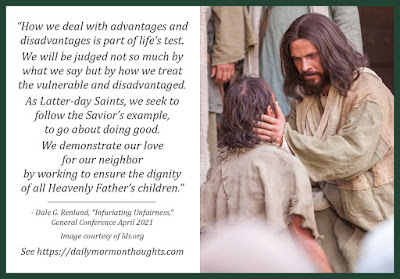"You may know that I used to treat patients with heart failure. Their best outcomes were obtained by following established, evidence-based treatment plans. Despite knowing this, some patients tried to negotiate a different treatment plan. They said, 'I don’t want to take so many medications' or 'I don’t want to undergo so many follow-up tests.' Of course, patients were free to make their own decisions, but if they deviated from optimal treatment plans, their results suffered. Patients with heart failure cannot choose an inferior course and then blame their cardiologist for inferior outcomes."The same is true for us. Heavenly Father’s prescribed path leads to the best eternal outcomes. We are free to choose, but we cannot choose the consequences of not following the revealed path. The Lord has said, 'That which breaketh a law, and abideth not by law, but seeketh to become a law unto itself, … cannot be sanctified by law, neither by mercy, justice, nor judgment' (D&C 88:35). We cannot deviate from Heavenly Father’s course and then blame Him for inferior outcomes."- Dale G. Renlund, "Your Divine Nature and Eternal Destiny," General Conference April 2022, Women's SessionClick here to read or listen to the full discourse
I love Elder Renlund's perspective. We have seen this scenario played out pointedly in recent times. Some people are unwilling to take the advice of a doctor in a critical life situation; they either don't trust the doctor's wisdom and experience, or they think they know better for themselves than the doctor can know. To me, it seems very odd not to trust an expert who is established, recognized, and proven.
The application to critical spiritual matters is so much more important.
Both in medical and spiritual matters, we can always choose the action we take; but we can't choose the consequences of our action. That is a profound, critical, eternal distinction that we must never forget. We should never choose to "deviate from Heavenly Father's course" because the outcomes will certainly follow!
(Compilation and commentary by David Kenison, Orem, Utah, 2022)
































